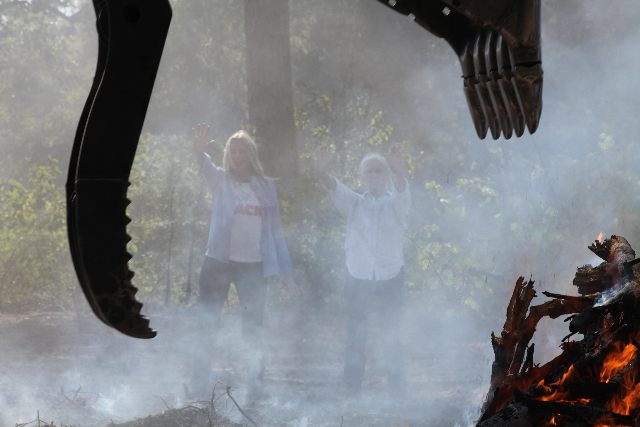Construction on a multimillion dollar barricade outside Canada’s Parliament was slated to begin today. Did someone have tar sands protest in mind in ordering the barricade built? If so, their efforts might be better spent in Texas. The Tar Sands Blockade has started a tree-sit in the woods of East Texas to keep Calgary-based TransCanada from building the Keystone XL pipeline.
The story broke north of the 49th parallel last Thursday, when East Texas farm owner Eleanor Fairchild was arrested for “trespassing” on her own farm with celebrity Daryl Hannah. Fairchild and Hannah blocked an excavator operated by a TransCanada employee who would not turn it off. But activists have been blocking construction on Keystone XL since August.
Fairchild and Hannah’s civil disobedience is one of six direct actions that has blocked construction on the Keystone XL since President Obama expedited the pipeline’s permitting process earlier this year. Landowners and climate justice organizers have put up an aerial blockade and locked themselves in the path of construction equipment.
While Enbridge took a page from the Keystone Kops playbook with its response to the 2010 tar sands oil spill in Michigan, TransCanada seems fond of the bull in a china shop approach to pipeline construction.
“For the past seven days there’s been 24-hour police surveillance and the blockade’s learned that TransCanada has hired off-duty police officers to be their private security force. They’re paying out of town cops to babysit the blockade and these police officers are wearing their uniforms,” says Tar Sands Blockade spokesperson Ron Seifert. “What’s interesting here is you have the government itself working for TransCanada,” says Seifert.
Keystone XL protesters have also been met with TransCanada-condoned brutality, according to Seifert. It was September 26, the third day of the aerial blockade. As construction grew near, two protesters, Shannon Bebe and Benjamin Franklin, locked to each other through the frame of a construction vehicle. Seifert recounts the event:
“Those blockaders were met with the police who really didn’t do too much, just tried to talk them out of their protest for a couple of hours. However, things changed dramatically when TransCanada supervisors arrived on the scene. They had a private huddle with the police officers and immediately thereafter the police became extraordinarily aggressive and brutal.
They put the blockaders in chokeholds. They handcuffed them. They put them in stress positions by twisting their free arms behind their backs and handcuffed them in that antagonizing position. They contorted the locks around their wrists and abraded their skin. [Then] they sprayed their open wounds with pepper spray.
Finally, after none of this made [Bebe and Franklin] leave, they resorted to tasing. They tased multiple times until [the protesters] finally relinquished and unlocked from the equipment. All of this — what I would call torture — was being watched by TransCanada supervisors who were there the whole time.
And as soon as the protesters were taken away, TransCanada’s supervisors approached the police to congratulate them on ‘a job well done.'”
When asked about the treatment received by Bebe and Franklin, TransCanada spokesperson David Dodson indicated that the Wood County Sheriff’s Department could provide an account. The Wood County Sheriff’s Department has provided no response on TransCanada’s reported hiring of off-duty police officers or the conditions of Bebe and Franklin’s arrest.
AJ Klein, a community organizer in Vancouver who, with others, launched the “Hey TransCanada, TORTURE isn’t an option” action on Facebook, notes that a number of initiatives have emerged.
“There’s an Avaaz petition people can sign,” says Klein. A number of ENGOs have also signed a Rainforest Action Network initiated letter in solidarity with the Tar Sands Blockade.
While the Tar Sands Blockade resists TransCanada’s ramming, there will be a direct action training camp October 12-14 so more can join and support the blockade. The training camp will be held in Texas. Ottawa, it turns out, is just one of many places to stop the tar sands these days.
Christine Leclerc is a Vancouver-based author and activist. She is an editor of The Enpipe Line: 70,000+ kilometres of poetry written in resistance to the Enbridge Northern Gateway Pipelines proposal. You can follow her on Twitter @xineleclerc.
Photo: Tar Sands Blockade. Celebrity Daryl Hannah and East Texas farm owner Eleanor Fairchild block an excavator to stop TransCanada from tearing up Fairchild’s land for Keystone XL pipeline construction.



